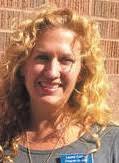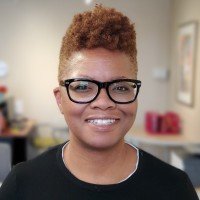Local organizations offer various resources
AGING WELL
By CHLOE PETER
 Laurel Collins of Hamline Midway Elders
Laurel Collins of Hamline Midway EldersA senior who regularly attends luncheons and games group at Hamline Midway Elders, 1514 Englewood Ave., reflected to one of the staff about how her time during the pandemic was going. She mentioned that she was used to living alone, but that COVID-19 had brought on new challenges. Talking on the phone just wasn’t the same for her. She used to have a group or class that she went to each day, but now, once a week was normally all she had.
Hamline Midway Elders (HME) is a non-profit organization that aims to provide volunteer sand professional service to seniors in their own homes. HME was founded in 2001 in order to focus on its own local seniors. Hamline Midway Elders is also a part of The Living at Home Network, a Minnesota program that supports community-owned and non-profit organizations that help the state’s seniors live at home.
The adjustment to most events now happening online was also a difficult switch for some. Many seniors needed to order groceries online for the very first time. Or, use telehealth for medical appointments instead of going in. Laurel Collins, the program director for Hamline Midway Elders, mentioned that with libraries, community centers and the YMCA closed, it became even more difficult for seniors to find ways to connect without needing to figure out Zoom or Skype.
“Some seniors are not comfortable using computers and smartphones, so this can be difficult,” Collins said. “Pre-COVID-19, our program had offered in-person classes like exercise, yoga, knitting, and we held monthly luncheon events that were well-attended. These opportunities to be together are greatly missed.”
But even with the challenges presented to them, Collins believes that the seniors in the community are resilient. Many have reached out to family, friends or neighbors for help. Groups like the tai chi instructors, who are seniors themselves, adapted their class to be held online and have continued since April. Many have ordered books through the contactless program offered at the St. Paul library or are getting more time outside.
Even though none of the in-person classes are being held at this time, HME continues to help seniors with rides to essential medical appointments, grocery and other deliveries to their homes, and assistance with yard chores. Their staff and volunteers follow Minnesota Department of Health guidelines related to wearing masks at all times, washing hands and wiping down the office or car, limiting interaction with people we are helping.
“Now, with COVID-19 precautions, we still visit by phone or Zoom, or from outside their front door!” Collins said.
HME still encourages the community to still take part in helping seniors. Cards can be sent in to HME’s address and will be distributed to the seniors that they visit. They also organize groups to help the seniors with their yard work or look for volunteers to be drivers. To be a part of these groups, contact HME at 651-209-6542.
“Reach out to your older neighbors, ask them how you can help. Maybe it’s picking up library books for them or helping with outdoor housework or yard chores,” Collins said.
In planning ahead, Collins fears for how many difficulties there still are to come.
“Winter in Minnesota can isolate people with the struggles of getting around, and I fear that this winter may be a tough one if we still have pandemic precautions in place,” Collins said.
Especially at the beginning of the pandemic, transportation was very challenging for the seniors. Minnesota winters will most likely make it even more difficult for seniors to get to the places they need whether it be for groceries, medical visits, or for activities. Collins encourages people to reach out to offer help to anyone in the community, not just the seniors.
“All humans need contact and care, but some are more isolated than others. A community that is aware of its members and reaches out to all is a happier and healthier community,” Collins said, “The pandemic has shown how important it is for all of us to come together to get through this!”
LONELINESS AND ISOLATION
 Larvel Bunker
Larvel BunkerLarvel Bunker, the co-owner of Comfort Keepers Twin Cities, (275 4th St. E., Suite 345 in St. Paul), believes that loneliness is a big struggle for many seniors during the pandemic. Socially isolated seniors have a greater risk of mental and physical decline while socially engaged seniors have higher levels of physical, mental and cognitive functioning according to a study done by Forbes. Social interaction may even slow Alzheimer and Dementia patients’ decline, according to the National Institute of Health.
Comfort Keepers Twin Cities provides in-home, non-medical care for seniors and other adults in need of assistance with daily activities. They have more than 700 offices nationwide, and serve the local communities in St. Paul and Minneapolis. Along with daily assistance, Comfort Keepers Twin Cities provides 24-hour home care, dementia and Alzheimer’s disease care and end-of-life care.
“Feelings of isolation are universal and far reaching, especially during the statewide Stay at Home order. Some seniors found themselves walled-off even from residents within their own buildings, which although necessary for safety, could not have been easy on seniors and may have lasting effects on some,” Bunker said.
Comments
No comments on this item Please log in to comment by clicking here